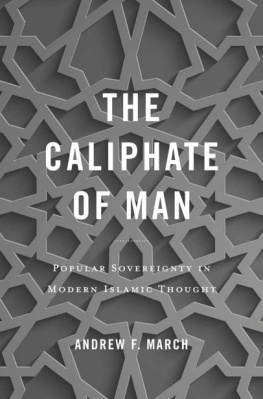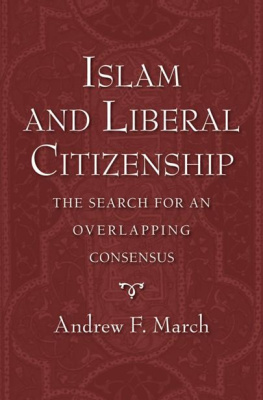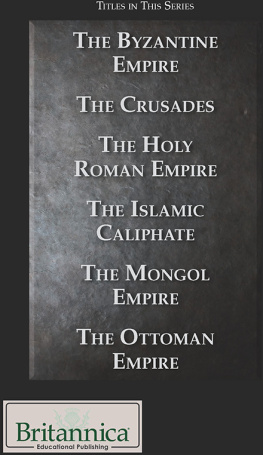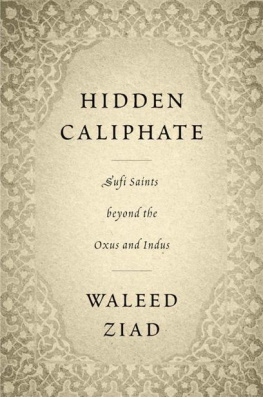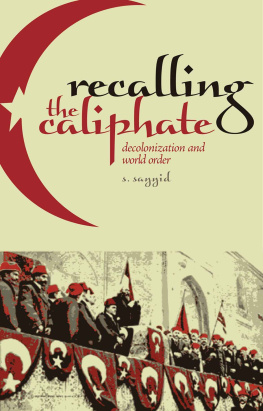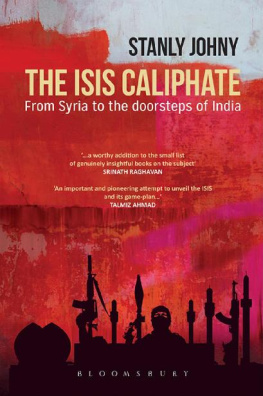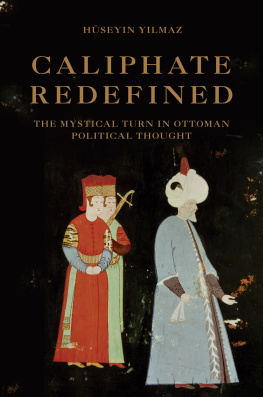Andrew F. March - The Caliphate of Man
Here you can read online Andrew F. March - The Caliphate of Man full text of the book (entire story) in english for free. Download pdf and epub, get meaning, cover and reviews about this ebook. year: 2019, publisher: Harvard University Press, genre: Politics. Description of the work, (preface) as well as reviews are available. Best literature library LitArk.com created for fans of good reading and offers a wide selection of genres:
Romance novel
Science fiction
Adventure
Detective
Science
History
Home and family
Prose
Art
Politics
Computer
Non-fiction
Religion
Business
Children
Humor
Choose a favorite category and find really read worthwhile books. Enjoy immersion in the world of imagination, feel the emotions of the characters or learn something new for yourself, make an fascinating discovery.
- Book:The Caliphate of Man
- Author:
- Publisher:Harvard University Press
- Genre:
- Year:2019
- Rating:5 / 5
- Favourites:Add to favourites
- Your mark:
- 100
- 1
- 2
- 3
- 4
- 5
The Caliphate of Man: summary, description and annotation
We offer to read an annotation, description, summary or preface (depends on what the author of the book "The Caliphate of Man" wrote himself). If you haven't found the necessary information about the book — write in the comments, we will try to find it.
The Caliphate of Man — read online for free the complete book (whole text) full work
Below is the text of the book, divided by pages. System saving the place of the last page read, allows you to conveniently read the book "The Caliphate of Man" online for free, without having to search again every time where you left off. Put a bookmark, and you can go to the page where you finished reading at any time.
Font size:
Interval:
Bookmark:
THE CALIPHATE OF MAN
Popular Sovereignty in Modern Islamic Thought
Andrew F. March

The Belknap Press of
Harvard University Press
Cambridge, Massachusetts / London, England / 2019
Copyright 2019 by the President and Fellows of Harvard College
All rights reserved
Jacket design: Jill Breitbarth
Jacket art: DamienGeso/iStock/Getty Images Plus
978-0-674-98783-8 (alk. paper)
978-0-674-24274-6 (EPUB)
978-0-674-24275-3 (MOBI)
978-0-674-24273-9 (PDF)
The Library of Congress has cataloged the printed edition as follows:
Names: March, Andrew F., 1976- author.
Title: The caliphate of man : popular sovereignty in modern Islamic thought / Andrew F. March.
Description: Cambridge, Massachusetts : The Belknap Press, Harvard University Press, 2019. | Includes bibliographical references and index.
Identifiers: LCCN 2019010887
Subjects: LCSH: Islam and politics. | Islam and state. | Ummah (Islam) | Caliphate. | Islamic fundamentalism. | Islamic countriesPolitics and government.
Classification: LCC BP173.7 .M3769 2019 | DDC 320.55/7dc23 LC record available at https://lccn.loc.gov/2019010887
To Tamir and Ayla
On February 18, 2011, one week after popular protests forced the downfall of the Egyptian President Hosni Mubarak, an estimated 2 million Egyptians assembled in Cairos Tahrir Square for a Day of Victory celebration. This was a Friday, the Muslim day of communal prayer. Leading the prayer and delivering the sermon that day was 84-year-old Egyptian scholar Ysuf al-Qaraw, who had lived in exile in Qatar since 1961 and was probably the single best-known global intellectual figure associated with the Islamist movement.
Qaraws ecumenical sermon is a window into a certain political theology. Although a sermon is not a political treatise, Qaraw could not avoid invoking a vision of dual popular and theocratic sovereignty over political life. This Friday was a commemoration of the victory of the people, and Qaraw duly honors the Egyptian spirit, the spirit that encompasses all. I hope from the people of Egypt that it sticks to this unity. Moreover, he warns the as-yet-untoppled Arab dictators that the Arab world has changed from the inside. So, do not stand against the people. It is not possible that the people shall remain silent. Dialogue with them in a real dialogue, not to patch things up, but with constructive actions that put things in their places, respect the minds of people [al-ns] and respect the minds of the people [al-shab]!
But what is the essence of this people, and what is the source of its power? For Qaraw, the victorious multitude is a believing people: This is the unity of a line of people praying. Let there be no fanaticism! We are all believers. We have to believe in God and deepen our faith. We are all Egyptians. We are all rising up against falseness. We are all angry on behalf of the Truth! And it is a believing people that has the power to move even the divine will: It was inevitable that Egypt be liberated, because these youth willed it, and when the youth will, their will participates in the will of God. Nobody will be able to fight the divine decrees, nor to delay the day when it rises. This world has changed and the world has evolved. Without entering into practical questions of law and sovereignty over a new legal order, Qaraw expresses a political theology whereby the world is moved by a harmony of popular and divine will, a dual sovereignty according to which the peoples supremacy over its governors is absolute. That popular sovereignty is constrained by a higher, divine sovereignty. But this is not only a relationship of hierarchy and restraint. It is a relationship of harmony and representation. The people not only realizes its own essence through obedience to God; it in some way represents and advances divine purposes.
This book argues that this vision of popular sovereignty is not merely demagogic flattery in homiletic form, but rather reflects a genuine intellectual revolution in modern Islamic thought, from a view of politics as just guardianship and pious representation by rulers and scholars to a distinctive vision of democracy whereby a just and pious people governs itself while also representing Gods instructions to humanity. This intellectual revolution involved more than political pragmatism or superficial adoption of democratic language. It consisted in a comprehensive reformulation of Islamic political philosophy, built in particular on a theological claim about mankinds status as Gods vicegerentor caliphon earth. That reformulation involved not only reducing rulers to their proper status as agents of the people but also implicitly raising the people to the ultimate arbiters of Gods law. If Islamism as a political theology represents a grand idea, one that is meant to challenge and replace others in the modern Muslim public sphere, it is this. The 2011 Arab revolutions were both a unique opportunity for this grand idea to be tested politically and, perhaps, the historical event that consigned this idea to the realm of the ideal. What was the ideal, where did it come from, and what were its theoretical conditions of possibility? If it is now a matter of history, and intellectual history at that, does this not leave Islamists with a kind of intellectual crisis as they seek to define what distinctive approach to political life Islam has to offer?
From the winter of 2010 through the spring and summer of 2011, not just Cairo, but the capitals and major cities of Tunisia, Syria, Libya, Jordan, Yemen, Morocco, and Bahrain erupted in popular demonstrations. This alone was not unprecedented. But in this case the unprecedented did happen. Two of the longest ruling, and apparently most stable, rulers in the Arab Middle East were forced out of power by popular will and intransigence. In other countries of the Arab Spring, governments successfully co-opted or suppressed nascent protest movements. In others (Libya, Syria, Yemen), the initially nonviolent protest movements descended into devastating civil wars.
Tunisia and Egypt stand out from these events for clear historical and political reasons. In both countries, mass protests and sit-ins succeeded remarkably quickly, in the face of severe state repression and considerable loss of life, in forcing the resignations of previously untouchable rulers, if not the regime and state behind those rulers. I do not wish to overemphasize the religious meaning of these revolts. In both countries, the protests were not primarily driven by the numbers and organizational power of the main Islamist movements. But the importance of Islamic discourses for the revolutions, and of the revolutions for Islamic discourses, should also not be underemphasized. Religious symbols of sacrifice and forms of solidarity were particularly important in the Egyptian contextmost famously when Muslims and Christians took turns forming protective walls during prayers. Moreover, regimes were quick to deploy official religious authorities to condemn anti-regime demonstrations.
Nor were the protests ideologically secularist or anti-Islamist.The meaning of the revolutions would be revealed in time through the transformation of the corrupt states they intended to topple.
Like electricity, popular power has to go somewhere. It either dissipates and leaves the prior regime in place, or helps to constitute something new. But that something new is, if not a seizure by some narrow group, often merely a form of ordinary, banal politics, even when it involves the drafting of new constitutions. It is precisely the difficulty of sustaining the magical and inspiring nature of the revolutionary moment that is, above all, not so many other thingsbanal, petty, boring, corrupt, ordinary, tyrannicalthat so often causes the disappointing crash after the high of the victory, that feeling of the lost treasure when everything was possible and everyone was sincere.
Font size:
Interval:
Bookmark:
Similar books «The Caliphate of Man»
Look at similar books to The Caliphate of Man. We have selected literature similar in name and meaning in the hope of providing readers with more options to find new, interesting, not yet read works.
Discussion, reviews of the book The Caliphate of Man and just readers' own opinions. Leave your comments, write what you think about the work, its meaning or the main characters. Specify what exactly you liked and what you didn't like, and why you think so.

